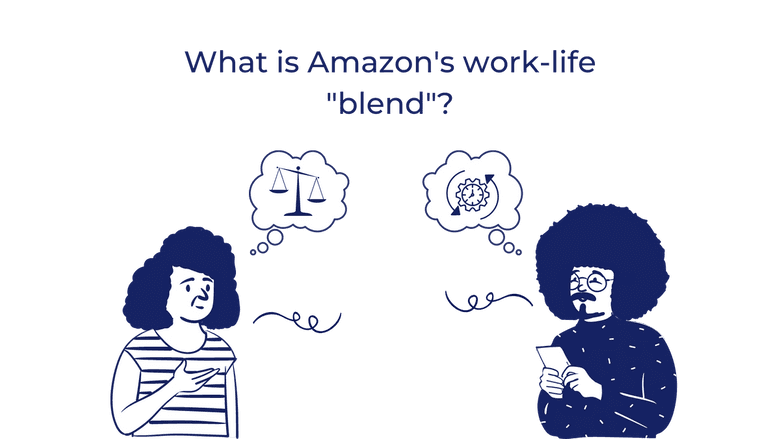Is Work-Life Balance the Reason Behind Amazon's Turnover Rate?
We interviewed former and current employees to find out the truth about the culture at Amazon.
Despite its prestige as a FAANG company, Amazon has its fair share of employee critics, even outside of complaints about warehouse conditions (especially now with COVID-19). The tech giant has one of the worst employee retention rates in the industry, with a median tenure of roughly one year, according to a PayScale report. However, with nearly 800,000 employees, Amazon isn’t exactly close to imploding for lack of workers. In fact, a software development position at Amazon in Seattle is still a goal to strive for, as well as a valuable addition to a resume.
So once you get that coveted role, why wouldn’t you want to stay?
Work-Life Balance is an Issue

Amazon doesn’t have a reputation for making it easy to maintain a life outside of work. In fact, one of its most common criticisms on Glassdoor is the company’s lack of work-life balance and long hours. One reviewer says,
“Once you get the hang of things, the amount of work to do will feel endless. It's exciting because it helps you grow and learn, but it can be stressful at times too.”
Jonathan*, a former Amazon software development intern who currently works for Facebook, says that expectations largely depend on your manager.
“Some managers want to really overwork their employees and get as much out of them as possible,” he says, but others are more chill.
However, he noticed that Amazon tends to have longer hours on average than other companies he’s been at.
This culture shouldn’t be surprising, as the Amazon CEO Jeff Bezos publicly rejects the term work-life balance. Instead he promotes the idea of a work-life blend, saying that the two don’t have to be mutually exclusive.
However, some have criticized this notion, touting the benefits of setting aside time to distance yourself from the office.
Cutthroat Environment

Amazon’s competitive culture isn’t necessarily a bad thing. Similar to Apple, many people are fueled by a drive to stand out among their peers, and if that’s you, then constant evaluation can actually work to your advantage.
Thomas*, a former Amazon engineer, was initially drawn to the company because he thought he’d find recognition based on its focus on data and how employees work.
On the other hand, some workers are intimidated by Amazon’s stack rank system, which puts the bottom 5% on performance improvement plans (PIPs).
These employees need to create a plan on how to improve or “they’re essentially booted out of the company,” Jonathan says. He also says that, while evaluating on a curve may sound scary, it doesn’t necessarily raise the bar by a lot.
“I personally think that if you put in your effort and you’re delivering, you’re not going to be in that bottom 5%,” he says.
However, the system is still widely criticized both inside and outside the company, with some saying that a PIP is essentially a precursor to an impending layoff. Not exactly a recipe for work-life harmony for Amazon employees.
Benefits and Perks (or Lack Thereof)

In the world of big tech, Amazon is infamous for its frugality...
Many current employees on Glassdoor complain about the lack of free food, a common perk for even smaller tech companies. Jonathan describes it as a “typical corporate company,” with modest provisions like coffee, tea and snacks for employees.
Some of Amazon’s competitors, in contrast, offer generous day-to-day benefits including fitness classes, massage sessions, and even on-site haircuts. Jonathan admits that perks played a role in his decision to work at Facebook over Amazon after graduation. At the social media conglomerate’s headquarters, he can just drop off his laundry onsite to have it taken care of if he’s in a pinch.
“It’s all these little bitty extra things [that let you] focus on your work,” he says. “If you’ll work just as hard, you might as well go somewhere that takes care of its employees.”
👉 Learn more about Amazon salary and benefits here.
This applies to compensation too...
According to many employees, Amazon’s penchant for saving money is not just embedded it the work culture - it also bleeds into salaries.
Compared to other software employers, Amazon generally offers lower pay and largely stock-based compensation. Glassdoor reports an Amazon software engineer’s base pay as roughly $118,000, compared to about $132,000 at Google and $133,000 at Facebook, but it can vary from person to person. Whether or not that gap seems significant, Thomas and Jonathan both recall that many engineers seemed to leave after getting higher-pay opportunities elsewhere.
Survival of the Fittest

While the Amazon software engineer title still earns respect in the tech industry, it has a reputation in some circles for being less exclusive than other positions in big tech. Some employee reviews on Glassdoor even list Amazon’s “easy interview” as a pro to working there.
Nick Dimitrov, owner of a career coaching company company, laid out his theories for Amazon’s attrition rate in a blog post. He says that successful companies can either hire well or fire well, and Amazon’s strength is the latter. He seems to reference Amazon’s PIP, or at least the culture that it fits into, saying,
“In an environment that sheds an incredible and constant amount of light on accountability, it’s impossible for underperformers to hide.”
Similarly, one commenter on the anonymous tech forum Blind says,
“Amazon has the lowest hiring bar I’ve seen for any tech company (i.e. friends have gotten in I wouldn’t even consider [referring] to Uber), but to make up for it they fire low-performers fast.”
Anonymous employee reviews like this are more common for Amazon than other companies.
While some employees seem eager for an opportunity to leave their jobs at Amazon, every company has its drawbacks, and for others it’s a great fit. Many employees are drawn to the impact of the projects they get to work on, including emerging technologies like Amazon Web Services (AWS).
Either way, it’s always a good idea to know your values going into the recruitment process before settling into a place that’s not right for you.
The information provided herein is for general informational purposes only and is not intended to provide tax, legal, or investment advice and should not be construed as an offer to sell, a solicitation of an offer to buy, or a recommendation of any security by Candor, its employees and affiliates, or any third-party. Any expressions of opinion or assumptions are for illustrative purposes only and are subject to change without notice. Past performance is not a guarantee of future results and the opinions presented herein should not be viewed as an indicator of future performance. Investing in securities involves risk. Loss of principal is possible.
Third-party data has been obtained from sources we believe to be reliable; however, its accuracy, completeness, or reliability cannot be guaranteed. Candor does not receive compensation to promote or discuss any particular Company; however, Candor, its employees and affiliates, and/or its clients may hold positions in securities of the Companies discussed.
